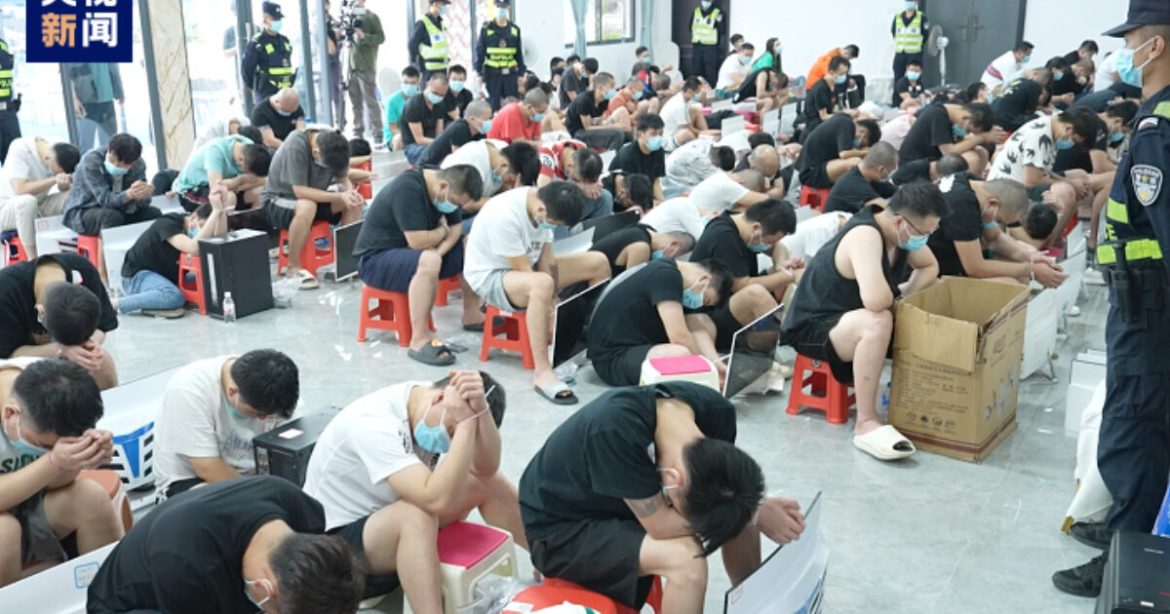

The Myanmar military junta continues to run extensive criminal enterprises that finance its war and atrocities, with cyber scam compounds at the center of its revenue stream. These scam centers are massive penal-colony-style compounds where trafficked workers conduct global cyber fraud operations, primarily “pig butchering” schemes that build trust with victims before stealing their life savings.
Between 2020 and 2024, victims worldwide lost roughly $75 billion to Southeast Asian cyber scams, with hundreds of thousands of trafficked individuals from multiple nationalities forced to work in compounds across Cambodia, Burma (Myanmar), and Laos.
These networks rely on U.S.-based social media, websites, and hosting services to lure Americans into cryptocurrency schemes before redirecting the funds into fake platforms and laundering the money overseas. Authorities noted that in some countries the scam industry is so large it accounts for nearly half of the national GDP, with Americans losing an estimated ten billion dollars per year.
Since the coup in 2021, Burma has become the regional epicenter of cyber scams, with more than thirty scam enclaves along the Thai border and nearly one hundred along the Chinese border. These operations are driven largely by Chinese transnational criminal networks that use front companies such as Trans Asia and Troth Star to finance, expand, and manage the compounds. Some of these same companies partnered with junta-aligned Border Guard Forces on major scam hubs such as Huanya and KK Park, both of which have repeatedly targeted American victims.
Scam centers operate openly because the Myanmar military and its Border Guard Forces protect and profit from them, allowing the compounds to avoid the airstrikes routinely inflicted on civilian and resistance areas. Multiple investigations confirm the junta’s central role in this transnational criminal ecosystem.
Phone geolocation data from 2024 shows frequent movement between Myawaddy scam compounds and government buildings in Naypyidaw, indicating a direct operational relationship between organized crime and the military regime. Junta-aligned armed groups are permitted to impose informal taxation on the scam industry in exchange for land, security, transportation, and logistical support.
Several of the most active scam sites are in Karen State, including the Tai Chang compound near Myawaddy, which sits on territory controlled by the Democratic Karen Benevolent Army. Another powerful Karen militia, the Democratic Karen Buddhist Army, plays a central role in sustaining the criminal economy. The DKBA provides security for multiple compounds and has been directly involved in abusing trafficked workers forced to run the scams.
Victims report beatings, electric shocks, being hung by their arms, and other violent treatment. Scam revenue funds DKBA activities, and the group collaborates with Chinese organized crime in drug trafficking, human trafficking, arms trafficking, wildlife trafficking, and money laundering.
The flow of scam revenue strengthens the junta’s allies and prolongs the war in Burma. The United Nations estimates that at least 120,000 people are trapped inside these compounds, facing forced labor, torture, and killings for failing to meet scamming quotas. Even as resistance organizations unite against the regime, the scam industry continues to thrive because it remains one of the junta’s most lucrative and protected sources of income.
On October 21–23, 2025, the Myanmar military junta, together with the Karen Border Guard Force and the Democratic Karen Benevolent Army, staged what it claimed was a raid on the KK Park scam hub in Myawaddy. The operation was intended to convince the international community that the regime was cracking down on cybercrime ahead of the upcoming elections, but investigators quickly determined it was a coordinated deception to deflect scrutiny.
The stunt began with the quiet evacuation of Chinese managers from KK Park, followed the next morning by the BGF opening the gates and allowing several thousand workers, including foreign nationals from dozens of countries, to flee. On October 23, regime forces selectively dynamited buildings to create the appearance of a major operation. The junta then announced it had seized thirty sets of Starlink satellite equipment and found no evidence of criminal activity.
Satellite imagery immediately contradicted these claims, showing that most of the compound remained intact, with damage to only about one hundred of approximately 250 buildings. Ringleaders and senior staff were not detained but relocated by the BGF and DKBA to other scam hubs in their territory, and scam operations across Myawaddy Township continued uninterrupted.
The scam economy has become an existential contribution to the regime’s war budget, with the Myanmar military collecting roughly half of the $192 million earned annually by the BGF from the Shwe Kokko scam center alone. In an effort to cut off this revenue stream, the Three Brotherhood Alliance attacked one of the most prominent scam hubs in northern Shan State.
The alliance is a coalition of three ethnic armed resistance groups fighting the military, the Arakan Army, the Myanmar National Democratic Alliance Army, and the Ta’ang National Liberation Army, commanding a combined force of roughly 45,000 to 50,000 troops.
Together, the alliance launched Operation 1027 on October 27, 2023, one of the most successful offensives against the junta since the 2021 coup. One of the stated aims of the operation was to eradicate scam centers in the Kokang Self-Administered Zone. After roughly ten weeks of fighting, the alliance captured Laukkai on January 5, 2024, forcing the collapse of the junta-controlled scam enclave.
The Laukkai scam hubs, run jointly by the junta and the Kokang BGF, had held tens of thousands of mostly Chinese nationals in brutal, prison-like conditions. China repeatedly pressured the junta to shut these operations down, but the military ignored every warning until the resistance offensive dismantled the entire network.

As a result, more than 40,000 people trapped in scamming operations were rescued by resistance forces and repatriated to China for screening and trial. The military defeat heavily damaged the cyber-scam industry in northern Myanmar, though the junta continued shielding criminal leaders and relocating operations to Myawaddy, Mongyai, Hopang, and even Yangon.
Investigations by Deutsche Welle documented torture, surveillance, killings, and the sale of victims inside compounds like KK Park. Survivors described these sites as hell on earth, with seventeen-hour workdays and constant threats of execution or resale for anyone who tried to escape. AFP investigations revealed that scam centers around Myawaddy continue expanding, with satellite images and drone footage showing frenetic building activity inside heavily guarded compounds.
Despite the overwhelming evidence, the scam industry continues because the junta and its BGF operate with total impunity. ASEAN and the wider international community had failed to apply meaningful pressure, allowing the junta to enrich itself through land control, taxation, security provision, trafficking, and the protection of criminal networks. However, this appears to be changing as the Trump administration has begun taking action against the scam centers and seems poised to formalize its Burma policy.
In September 2025, the U.S. Treasury Department sanctioned large networks of scam centers across Southeast Asia, including nine targets in Shwe Kokko, Burma, and ten in Cambodia, for stealing billions from Americans using forced labor and violence. In May 2025, FinCEN identified the Huione Group as a primary money-laundering concern under the USA PATRIOT Act for serving as a key node in laundering proceeds from cyber scams.
This month, the United States announced it would launch a new “Scam Center Strike Force” to target cybercriminals operating across Southeast Asia. As part of this effort, the U.S. Treasury Department sanctioned the Democratic Karen Buddhist Army, its senior leaders, and its partner companies under multiple executive orders. Treasury named DKBA leaders Saw Steel, Saw Sein Win, and Saw San Aung, along with Trans Asia director Chamu Sawang, all of whom profit directly from scam operations.
Under these sanctions, all property and interests in the United States belonging to the designated individuals and entities are blocked, and U.S. persons are prohibited from conducting transactions with them. Any company at least fifty percent owned by these sanctioned individuals is automatically blocked, and financial institutions risk enforcement action if they engage with them. Treasury emphasized that violators may face civil or criminal penalties.
The post What Are the Burma Scam Centers, How Much Have They Stolen from Americans, How Do They Affect the Revolution, and What Is the US Doing About It? appeared first on The Gateway Pundit.

